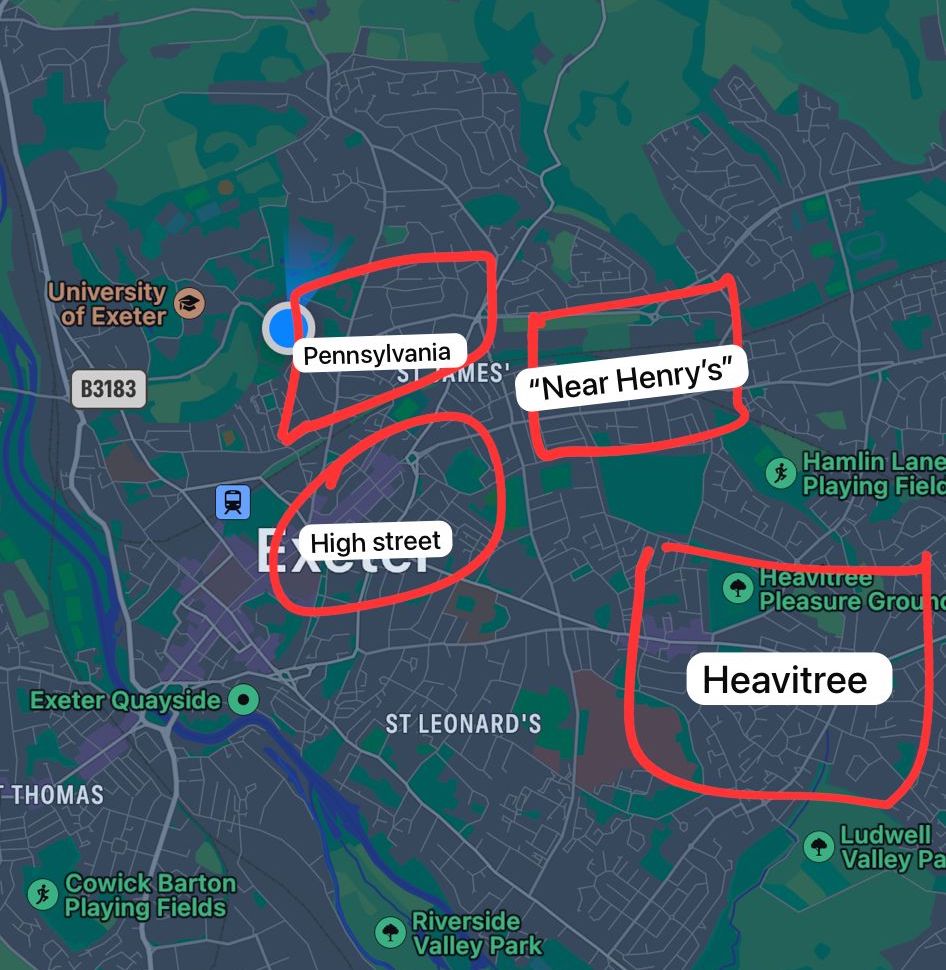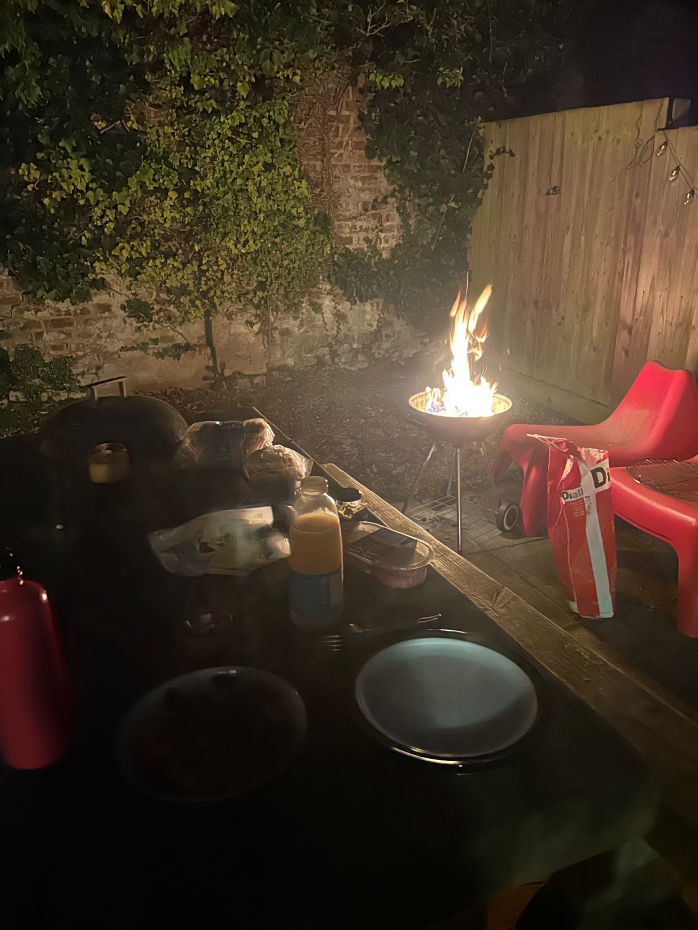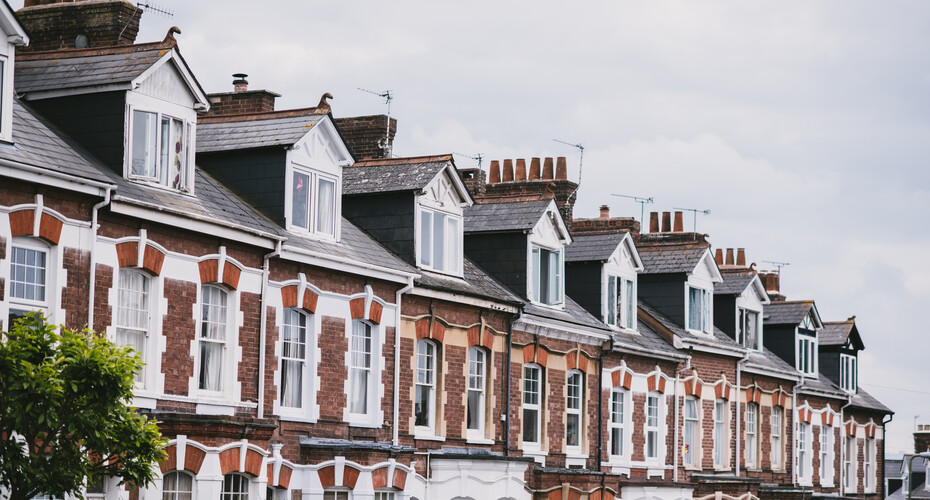In case you haven’t seen some of my blogs before, my name is Zara and I am a second-year psychology student here in Exeter. In this blog I thought I’d share with you all what it is like to live off-campus, in private sector accommodation in the city centre, mainly referring to purpose-built student accommodation, although there are other types of private accommodation. I study on the Streatham campus but I go to St Luke’s to study from time to time with friends since it is such a gorgeous building and it would be a waste to not go for a galivant around the grounds when I have a day off. I went just the other week and Cross Keys, which was the eating spot on campus, is so cosy with so many comfy seats and some really good food and coffee for an affordable price. The only gripe I had was it is a couple of miles away from where I currently live on Pennsylvania Road. By my unscientific and purely anecdotal experience, most students after their first year will live in 1 of 4 zones, the Pennsylvania road bubble (nearest Streatham), near Henry’s Bar (20 mins from both and the high street), Heavitree (cheapest, but much further from the high street and Streatham) and the high street/ town area which is bang in the middle of both campuses. I don’t currently live in town but I have before, and know lots of people who live in student accommodation in town such as the Depot, The Barn and Printworks, just to name a few. Next year I might be grouping with a few friends at the Depot and I’m here to tell you a few benefits of private accommodation in town and why I think it’s actually a really good deal. I’ll touch on convenience for food shops and activities, then safety and maintenance benefits and finally community.

Food shops
Ah, the dreaded food shops. You may not realise it but doing groceries will very quickly stop being fun as you start university. At first, it’s all “I can buy whatever I want and eat my favourite stuff all day!” but soon it’s “I bought £100 worth of food and now I’m out of everything again”. When I lived at Duryard (I’ve really been around the block in terms of accommodation!) which is a 40-minute walk from the high street, I refused to get the bus and walked back with bags upon bags of groceries every.single.week. Thankfully, I don’t do that anymore since I know someone with a car and we drive down once a week to do our shop but I can’t help but be green with envy at those who live in the middle of all the action. If my driver (boyfriend) isn’t free, I have to walk down hills and up hills just to feed myself, I feel like I’m on an expedition society hike. Those who live in town can get multiple little shops because they live right by all the Tescos and Sainsbury’s, it’s also a lot cheaper since the small corner shops tend to cost more for convenience. For example, in a pinch I could go to the small Co-op on Penny (Pennsylvania) Road but I’d probably be paying a little more than I would If I went to a big shop on the high street, and as a cheap university student, I would much rather save every penny I can.

Activities
Remember when I said most people live in 1 of 4 areas? If you want to meet up with friends who will probably live in another bubble to you, since they’re all pretty evenly populated, the high street is a happy compromise for everyone to meet at. It’s for that reason that I’d say it’s the most convenient because every other zone is about 10-30 minutes away from town by foot but also 10-30 minutes away from one another, it’s sort of a happy middle for everyone. I mean, even if you meet up you’ll probably want to catch a movie, have some food or go shopping anyway and that’s all in town. Statistically, it’s the most efficient meeting place for everyone to meet.

Maintenance and safety
I’ll break this down into fault reporting, safeguarding, and general convenience. I find that with a private accommodation building, things get fixed and sorted quicker since it’s a company and not a landlord/lady. Typically, if you report something is broken to the landlord they’ll call someone to come fix it within the week, and landlords and ladies, no offence to them, can sometimes not be the most communicative/responsive. Private purpose-built student accommodation works a lot like university accommodation where stuff gets reported and fixed by someone who works in or around the building, meaning they will get to it ASAP. Since it’s such a big organisation they do need all these things in place. My boyfriend used to live in Printworks and there are lots of heavy doors that you need a key to get through, as well as reception and security to get through. There are so many barriers in place to make sure nobody gets into your building let alone a flat or room that aren’t supposed to be there. Also, most accommodations use fobs instead of physical keys which are a lot easier to carry around. If you get locked out, it’s fairly easy to get let back in by calling a helpline. You can also replace your keys really quickly and easily, at reception, which isn’t an option in a house. With mail, it gets given to reception, so you never have to be home to collect anything. It’s basically mimicking all the benefits of halls whilst being in a better location. Something I haven’t yet touched on is the fact you can apply to live with friends, just like a house. After university, you will probably live somewhere like a house and lose all these benefits so you may as well keep living the silly fresher lifestyle longer since you’ll have to do more on your own later anyway.
Community
The final thing I’ll talk about is community. I sort of touched on this in the activities bit, but it totally helps to be equidistant from both campuses. I have a few friends who study at St Luke’s doing neuroscience and other tough medical-type degrees that don’t have heaps of time to hang out. I mean, most of us in university don’t in all honesty. It really helps to live somewhere so accessible to both campuses and shops since it’s not hard to meet up with anyone. There are also so many second, third and fourth (maybe even fifth) years living in private accommodation and it’s so nice living so close to one another in the same building. Private purpose-built student accommodation also has lots of common rooms and games rooms, which is also fantastic for meeting up and having a third space to sit and chat or play games when you don’t want to have to pay to sit at a restaurant or café. As a cheapskate who doesn’t want to have to pay to watch a movie with friends, or eat out, if we meet and book a movie room or hang in the games room I am a happy bunny.
Basically, it’s just a really good idea logistically for the same cost as a house. I get it, we all love the cute uni house aesthetic but trust me, for peace of mind, a house is kind of overrated and you can live that cute townhouse lifestyle after university when we are all working. Ultimately it doesn’t make a world of a difference when thinking about whether or not you’ll enjoy university because where you live doesn’t usually have a massive sway on your overall university experience (most of the time but not all, please don’t get a cheap place in a separate neighbouring town!), but it does change your routine significantly so I’d put in a bit of time to think it through what works best considering your priorities before deciding where you end up living!

